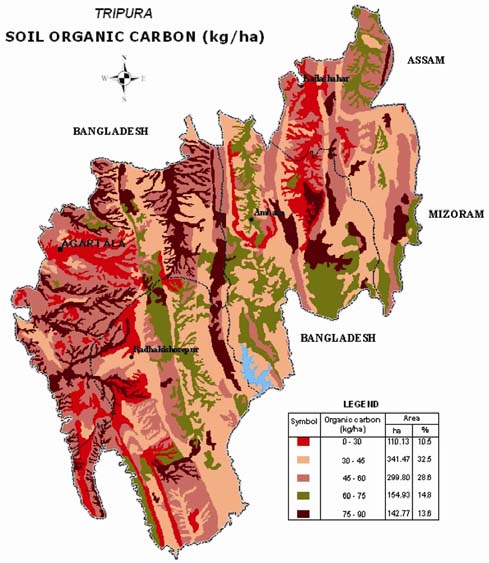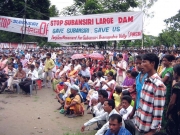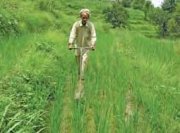Tripura
Optimal water resource management in water stress condition : A Newsletter of AFPRO Volume 2, Issue 2 of July 2011
Posted on 07 Jul, 2011 11:29 AM Small and marginal farmers are most affected from water stress situations, and need simple, sustainable and effective measures for water conservation and management.
Small and marginal farmers are most affected from water stress situations, and need simple, sustainable and effective measures for water conservation and management.
Soil information system for resource management in Tripura – A paper in Current Science
Posted on 30 Mar, 2011 09:03 AM In view of the global changing scenario the need of the hour is to produce a fresh group of earth scientists with specialization in soil and crop science, geology and geography with appreciable knowledge in GIS and other i
In view of the global changing scenario the need of the hour is to produce a fresh group of earth scientists with specialization in soil and crop science, geology and geography with appreciable knowledge in GIS and other i
Damming North East India - Juggernaut of hydropower projects threatens social and environmental security of region
Posted on 28 Dec, 2010 07:49 PM This report by Kalpavriksh, Aaranyak and ActionAid India deals with the large dams’ juggernaut, which happens to be the biggest ‘development’ intervention in this ecologically and geologically fragile, seismically active and culturally sensitive region in the coming days. With the Northeast identified as India’s ‘future powerhouse’ and at least 168 large hydroelectric projects set to majorly alter the riverscape, large dams are emerging as a major issue of conflict in the region.
This report by Kalpavriksh, Aaranyak and ActionAid India deals with the large dams’ juggernaut, which happens to be the biggest ‘development’ intervention in this ecologically and geologically fragile, seismically active and culturally sensitive region in the coming days. With the Northeast identified as India’s ‘future powerhouse’ and at least 168 large hydroelectric projects set to majorly alter the riverscape, large dams are emerging as a major issue of conflict in the region.
Although the current scale of dam-related developments far outstrips anything which took place in the past, the region has been no stranger to dam-related conflicts. For example, the Kaptai dam, built in the Chittagong Hill Tracts of East Pakistan (now Bangladesh) in the 1960s, submerged the traditional homelands of the Hajong and Chakma indigenous communities, and forced them to migrate into parts of Northeast India.
Farmers experiences on System of Rice Intensification in India – A report by ICRISAT-WWF
Posted on 14 Dec, 2010 08:29 PM This report on farmers’ experiences on System of Rice Intensification (SRI) in India by ICRISAT and WWF is an effort to compile the experiences of those farmers who pioneered the SRI method in various regions. They experimented in their own way, articulating their point of view on the method.
This report on farmers’ experiences on System of Rice Intensification (SRI) in India by ICRISAT and WWF is an effort to compile the experiences of those farmers who pioneered the SRI method in various regions. They experimented in their own way, articulating their point of view on the method.
The SRI is a national phenomenon in India and rice-cultivating farmers, particularly those who have less than one hectare of land, have experimented, refined, adopted and are promoting SRI. It is their hard work and trust that has spread this unknown method into all rice-growing states. Out of 564 rice-growing districts in India, SRI is being practiced by the farmers in about 216 districts.
Celebrating creative dissent in science
Posted on 13 Mar, 2009 10:37 AMIt gives me great pleasure to share with you the news of the recognition by the State of the work done by Dr Baharul Mazumder by bestowing the Acharya PC Ray award to Dr Baharul Majumder. One of the greatest learnings that I have had in understanding SRI is the recognition that despite having some of the most uncreative structures such as the ICAR in science research in India, people like Baharul are able to show what could and should be the real relation between science and democracy. When we had the 2nd national symposium in Tripura in Oct 2007 we coined this phrase 'Small state: Big results'. It is quite possible that many such small initiatives exist in other parts of the country too. I think the award is not only a recognition for SRI but also for new roles for agricultural scientists such as Baharul. It is not often that the Department of Science and Technology feels called upon to recognise the work of agricultural scientists. That the award is named after PC Ray, the scientist who was active in the freedom movement, makes it even more special.
May-June issue of "Dams,Rivers and People" : Study from Brazil on the global warming impact of methane emissions from large dams
Posted on 05 Jul, 2007 04:38 AM The May-June issue of "Dams, Rivers and People" is out and available here.
The May-June issue of "Dams, Rivers and People" is out and available here.